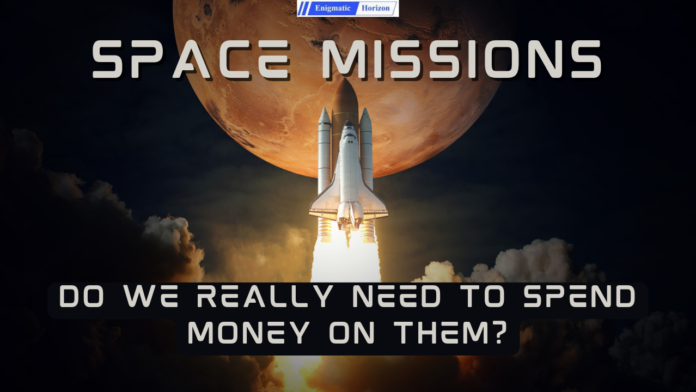Priyal Dholakia (Assistant Editor)
Space, the vast and mysterious expanse above us, has always captivated our imaginations. Whether it is the remarkable Mars missions or the moon landings, these ventures have become a source of fascination and wonder for us. But amidst the excitement, it is crucial for us to ponder: do these ventures really deserve so much money? Plus, are these ventures bringing any fruitful results?
Exploring the cosmos is a costly pursuit.
Space agencies and organisations worldwide invest billions of rupees in ambitious missions like moon landings and the search for life on Mars. While these ventures might help in pushing the boundaries of our knowledge, they do come at a hefty price.
Look at these stark figures to put things into perspective.
Chandrayaan-2 cost the Indian Space Research Organisation (ISRO) about 978 crore rupees ($130 million). About 4.5 billion rupees were spent on India’s Mars Orbiter Mission (Mangalyaan). The price tag for NASA’s Mars Rover journey was a shocking $2.7 billion.
These figures give us pause. Consider this: the cost of a single space mission could feed millions of hungry mouths or provide clean drinking water to communities in need. If we put the money to correct use, nearly 90 percent of the world’s problems could be solved.
Poverty, economic crises, and pressing issues are all present in our world today. Hunger, starvation, and poor nutrition are killing millions of people, including children. People even lack access to basic necessities like clean water and shelter. In this context, it seems illogical to allocate significant resources to space missions without addressing the pressing concerns on our own earth.
Jack Ma, the prominent Chinese billionaire and philanthropist, expressed it aptly in an interesting debate and exchange of opinions with Elon Musk, the international business magnate and founder of companies like SpaceX and Tesla. Sharing his insights, Jack Ma says, “It is great to send 1 million people to Mars, but we have got to care about the 7.4 billion people on Earth.” Continuing his thoughts, he opines that instead of focusing on space, people should direct their efforts and resources towards improving life on Earth and making it more sustainable.
Untapped earthly wonders are waiting to be explored.
While we gaze skyward, we often forget that our own earth holds vast, untapped, and unexplored regions. The Himalayas, the Antarctic sub-continent, and the vast marine depths remain largely unexplored. Astonishingly, over 80% of marine life and the underwater world remain unknown to us. Should we not focus on exploring and preserving our own earth before venturing into the depths of space?
While space missions cannot be completely discounted, it is essential to strike a balance between exploration and addressing earthly issues. Imagine a world where the resources poured into space missions are directed towards solving poverty, eradicating hunger, and providing education and healthcare for all. The impact would be profound and transformative, bringing tangible benefits to the lives of millions.
Parting words
Space missions may hold important scientific and exploratory significance. But we need to consider a few things. Decades ago, it was estimated that by 2015, humans would be landing on Mars, and start building colonies there. However, today, in 2023, forget Mars, we have not even managed to get back to the moon, although fifty years have passed since the last Moon landing.
Despite the importance of scientific exploration, we cannot lose sight of the pressing problems in our own world. With countless regions and challenges yet to be explored on Earth, it is only logical to prioritize those first. Allocating resources to alleviate poverty, hunger, and other pressing concerns will lead us to a more equitable and compassionate world. Once we have achieved this balance, our forays into space can take place with a clearer conscience and a greater sense of purpose.
